8 Powerful Benefits of Chess for Improves Thinking Skills
Chess for Improving Thinking Skills has long been celebrated as more than just a game; it is a powerful mental exercise that enhances cognitive function. Whether you’re a student, professional, or simply someone looking to sharpen your mind, the benefits of chess extend far beyond the board. By engaging in this ancient strategy game, players develop critical thinking, problem-solving skills, memory, and more. Chess challenges the mind to think several steps ahead, making it an ideal tool for boosting mental agility and focus.
The benefits of chess are numerous, especially when it comes to improving thinking skills. Each move requires careful consideration, patience, and strategic planning, all of which contribute to better decision-making in everyday life. From enhancing creativity to building concentration, chess offers a unique blend of mental challenges that can help individuals of all ages. In this article, we’ll explore eight powerful ways chess can improve thinking skills and why incorporating chess into your routine can lead to lasting cognitive benefits.
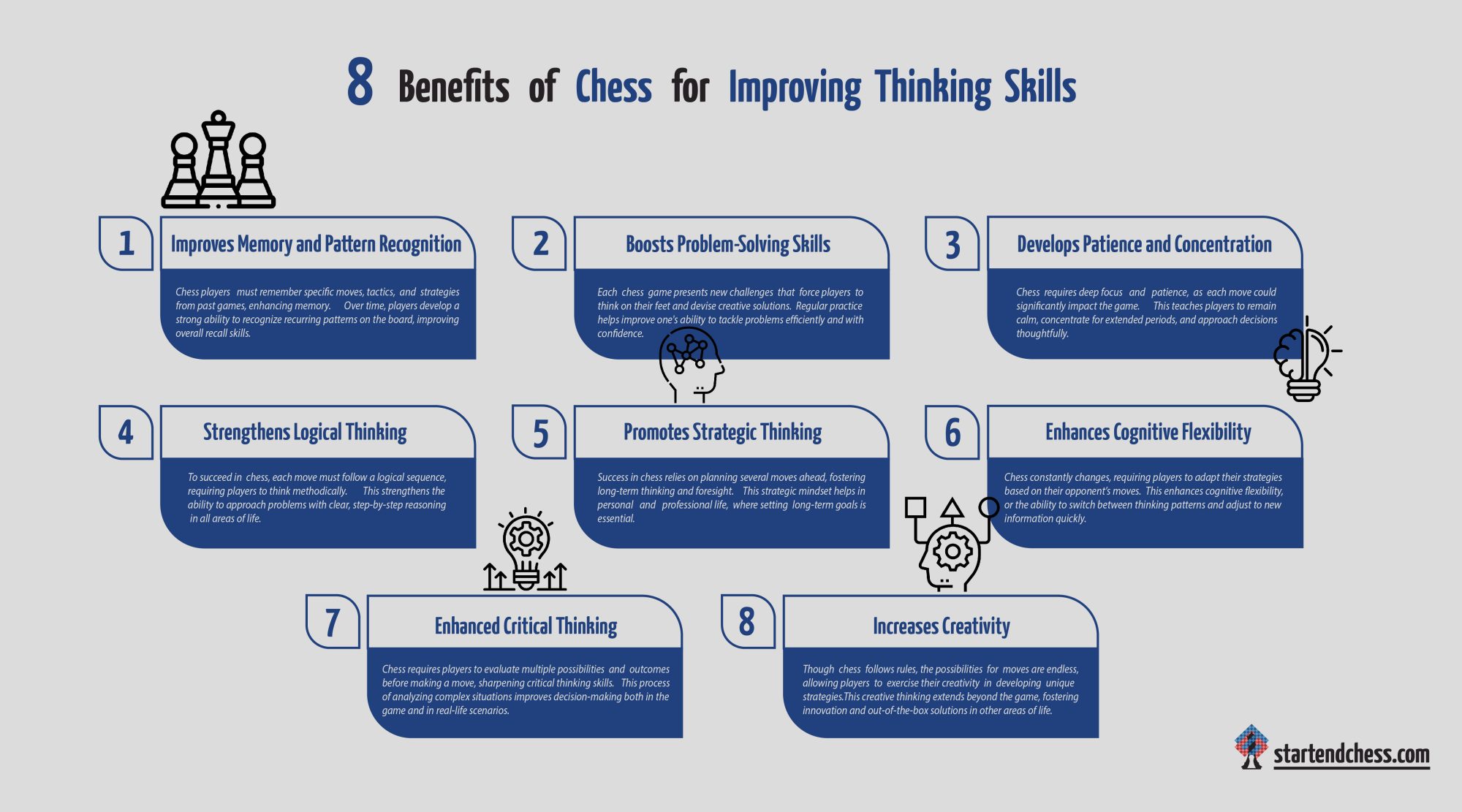
-
Enhanced Critical Thinking
Critical thinking encompasses the capacity for objectivity regarding information, a consideration of diverse perspectives, and the formulation of well-argued conclusions. Chess naturally enhances one’s critical thinking due to the inclusions of strategy and foresight in the game. A player has to identify his available moves, what his opponent might play, and any possible risks involved before making his decision. Every game is like a mental puzzle, requiring players to think several steps ahead in challenging their ability toward logical problem solving.
How Chess Improves Critical Thinking:
- Forces players to evaluate possible outcomes.
- Encourages objective analysis of strengths and weaknesses.
- Develops problem-solving abilities by analyzing complex positions.
-
Boosts Problem-Solving Skills
Essentially, it’s solving problems continuously in a game of chess. Right from the first move, there are scenarios to go through, and one has to find the right path towards a win. Chess players become adept at approaching each problem in a systematic manner: using trial and error, pattern recognition, and creativity. Herein, problem-solving can be applied in real life by helping an individual think on his feet and overcome obstacles.
How Chess Boosts Problem-Solving:
- Promotes creative thinking by finding unique solutions.
- Teaches players to adjust strategies when faced with new challenges.
- Enhances lateral thinking by requiring out-of-the-box solutions.
-
Improves Memory and Pattern Recognition
Chess players develop an exceptional capacity to remember patterns and strategies. Of the thousands of opening combinations, memorizing chess moves and tactics is compulsory for any serious player of the game. Every time a player practices through familiar patterns repeatedly, their ability to remember key positions and strategies increases, hence making quicker and more accurate decisions. Such enhancement in memory might later transcend into life outside the gameboard and boost general cognitive functions to aid in tasks involving memorization.
How Chess Improves Memory:
- Reinforces pattern recognition, aiding in faster decision-making.
- Helps players retain and recall complex information quickly.
- Develops a structured approach to memorization that benefits other areas of life.
-
Strengthens Logical Thinking
Success in playing chess is a result of logical thinking. Every move played in the game of chess should make sense, and thus, individuals are bound to think rationally and systematically about every decision made in the game. Playing chess enforces thinking in terms of causes and their effects-a method that leads to developing one’s logical thinking skills. It is a skill to know how to break down a problem into constituent parts and, with the significant help of reason, solve it. Automatically, better decision-making in every respect of life is seriously improved.
How Chess Strengthens Logical Thinking:
- Encourages players to evaluate all available data before making decisions.
- Requires logical step-by-step planning and execution of strategies.
- Reinforces the concept of consequences, teaching players to anticipate outcomes.
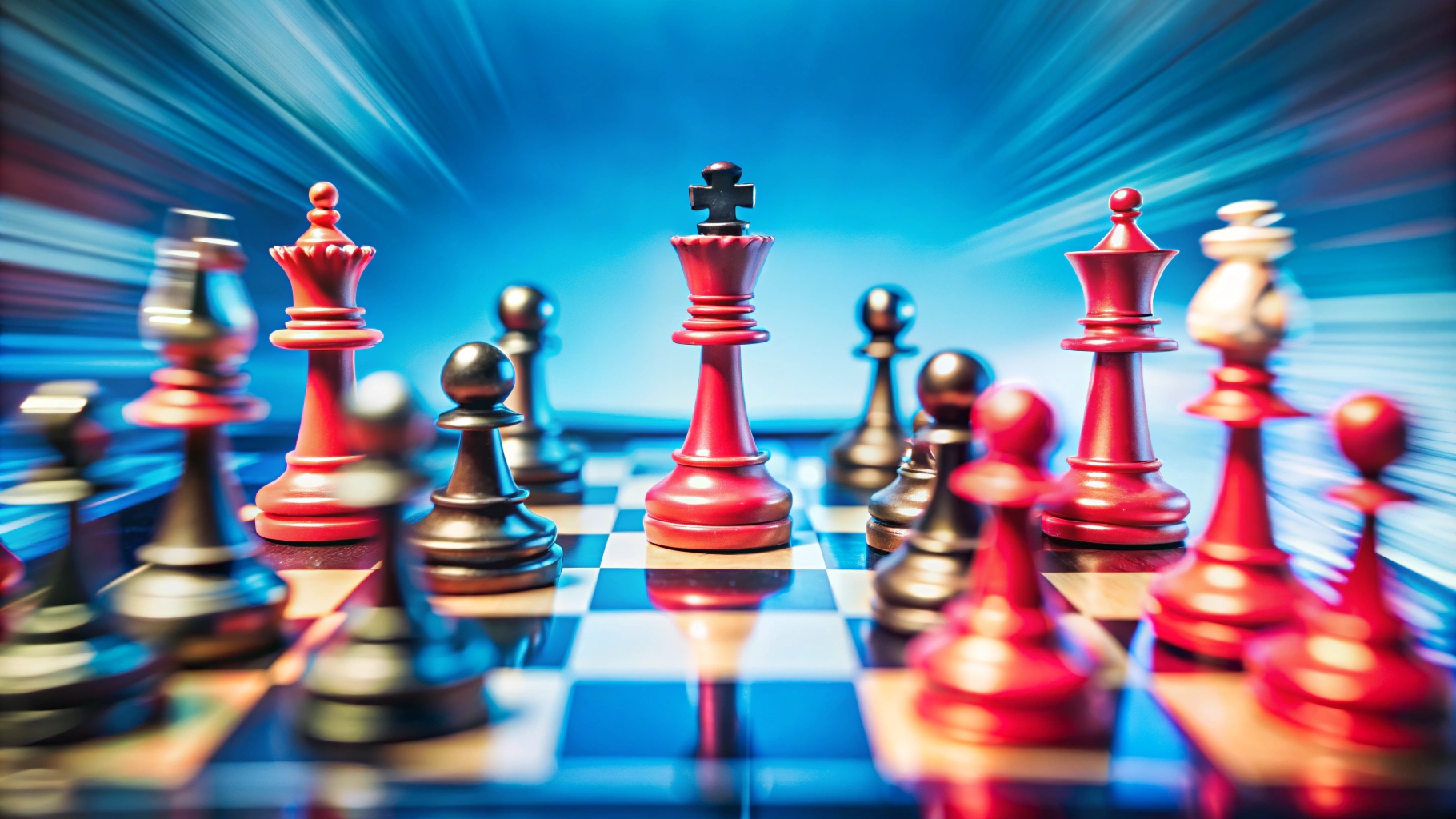
-
Enhances Cognitive Flexibility
It is the capacity of the brain to change with situations, switch between tasks, and think about different ideas all at once. Chess requires high levels of cognitive flexibility in constant strategy recalibration with every move from one’s opponent. A well-thought-out strategy can crumble with one unsuspecting move, and one should reassess the situation quickly and change tack. Further, the perceived capability to pivot reinforces one’s cognitive flexibility, therefore driving success in both personal and professional settings.
How Chess Enhances Cognitive Flexibility:
- Teaches players to shift strategies and adapt to changing situations.
- Involves managing multiple concepts and potential moves simultaneously.
- Encourages creative solutions when the expected path is blocked.
-
Promotes Strategic Thinking
Chess is a game of strategy. Winning players need to be thinking ahead, planning carefully, and considering the short-and-long-term moves that need to be played. Strategy involves prioritizing activities, weighing risks and benefits against one another, and then carrying out an actual execution of a well-thought-out plan. Chess helps build these skills in a person by forcing him not to think about his next move but how the game is going to play a number of moves later.
How Chess Promotes Strategic Thinking:
- Teaches players to consider both immediate and future consequences.
- Encourages long-term planning and goal-setting.
- Requires players to balance offense and defense, honing their decision-making.
-
Develops Patience and Concentration
Chess games can be long, and they take great focus. Every move should be thought over, and one wrong move can cost a person the game. Chess players develop patience and the capability of focusing for extended periods. This capability of focusing will develop with time, leading to an improved attention span and the capability to deal with multi-component mental chores without diversion.
How Chess Develops Patience and Concentration:
- Requires sustained focus and attention for long periods.
- Teaches players the value of waiting for the right moment to act.
- Enhances mental endurance and the ability to maintain clarity under pressure.
-
Increases Creativity
Chess is one of those games which deals with strategy and logic, yet is an essentially creative game. Out-of-the-box thinking, invention of new strategies, and finding innovative ways of trapping the opponent are all things players should think about. This is very important in creative problem-solving in complex positions where traditional methods may not apply. Such creative thinking can flow into other areas than chess in fields where innovation and thinking out of the box are required.
How Chess Increases Creativity:
- Encourages creative solutions to overcome difficult positions.
- Promotes thinking in new and original ways.
- Helps players find beauty in complex patterns and strategies.
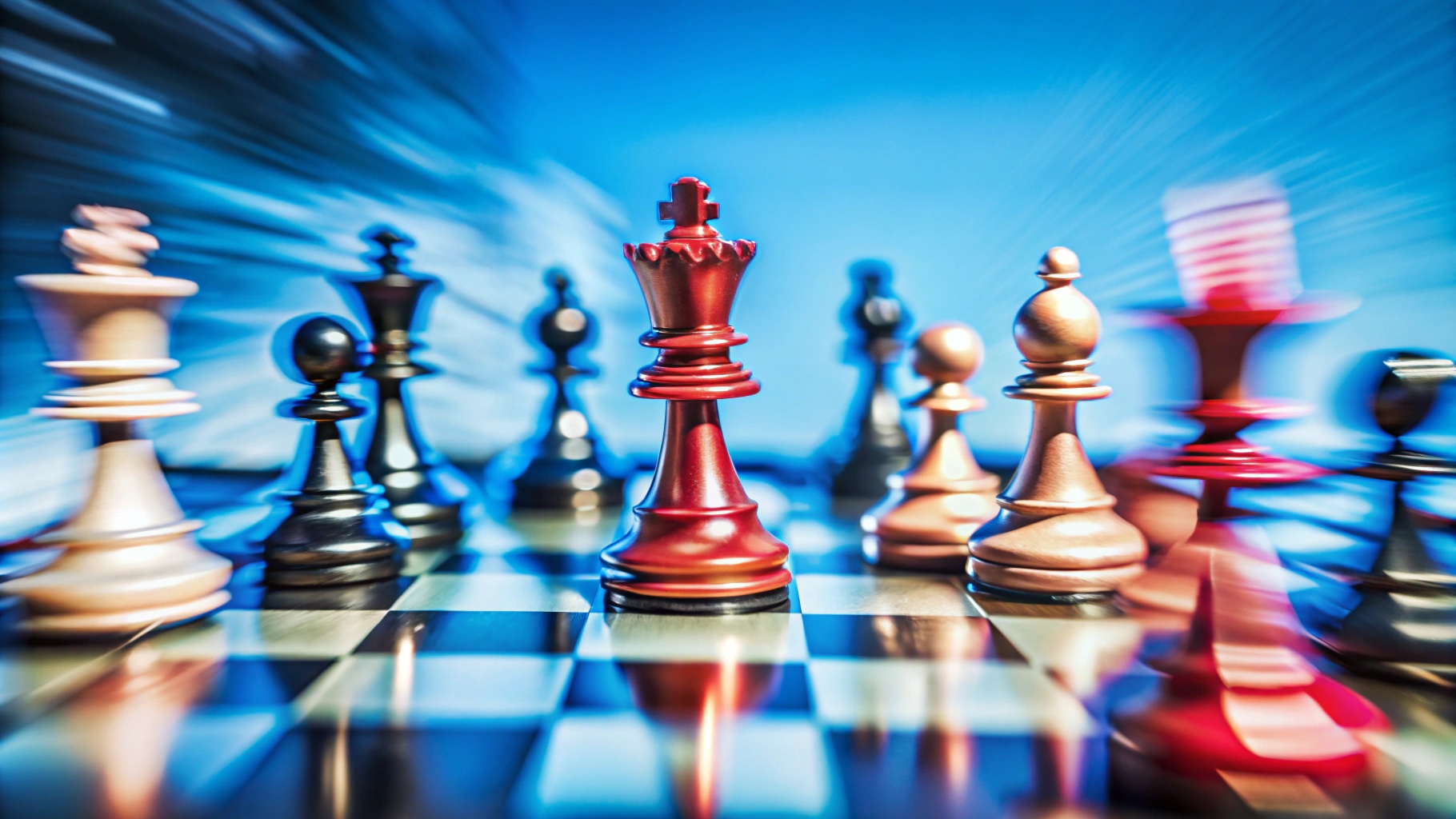
In conclusion, chess for improving thinking skills is a remarkable tool that enhances various cognitive abilities, from critical thinking and problem-solving to creativity and memory. By engaging regularly in chess, you’re not just playing a game — you’re giving your brain a full mental workout. This strategic game demands patience, concentration, and foresight, all of which translate into improved decision-making and mental clarity in everyday life. Whether you’re a beginner or an experienced player, the benefits of chess are vast and can help unlock your brain’s full potential.
If you’re looking to boost your cognitive abilities and sharpen your thinking skills, incorporating chess into your routine is an excellent way to achieve that. The benefits of chess go beyond the board, improving not only your mental agility but also your ability to handle real-life challenges with creativity and strategic insight. So, whether you’re aiming to improve your focus, enhance problem-solving, or simply enjoy a stimulating mental exercise, chess is the perfect game to elevate your thinking skills and expand your mind.
We’ve prepared a podcast to accompany this article, offering the same insights in an audio format. If you enjoy listening, give it a play!

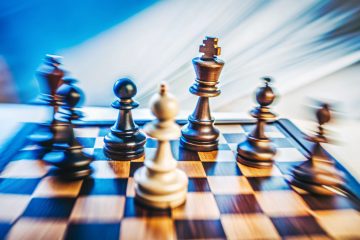
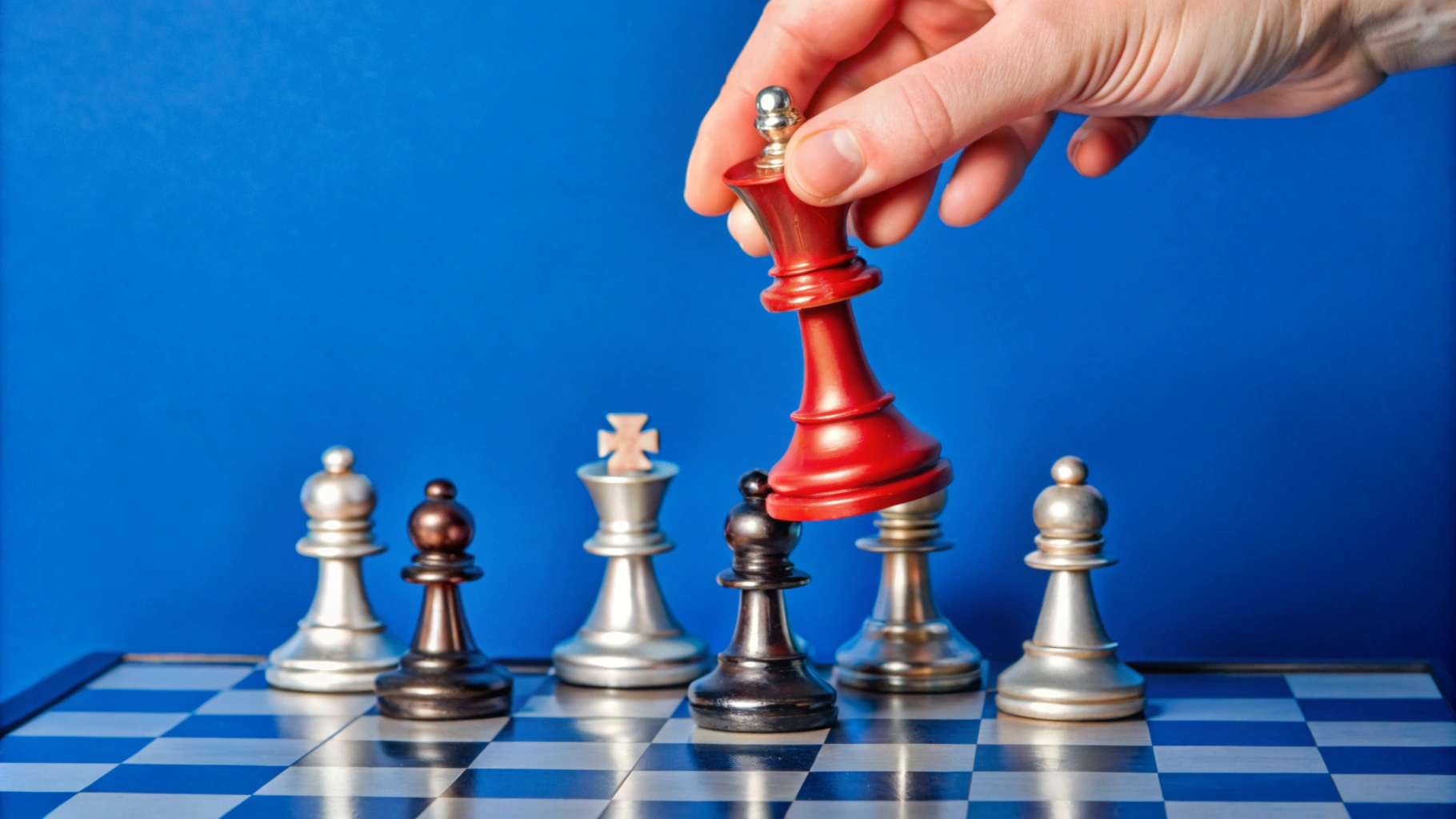
0 Comments